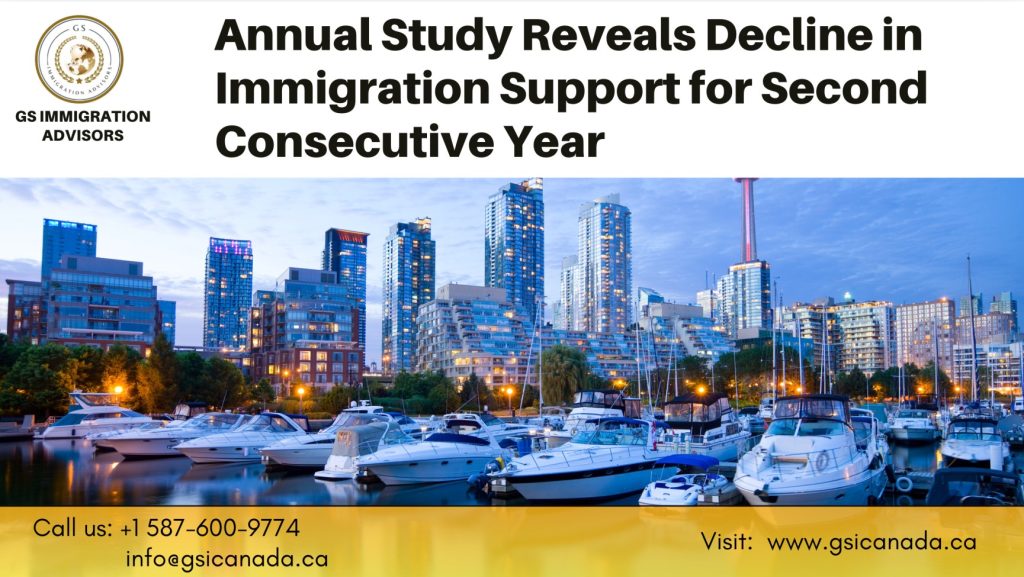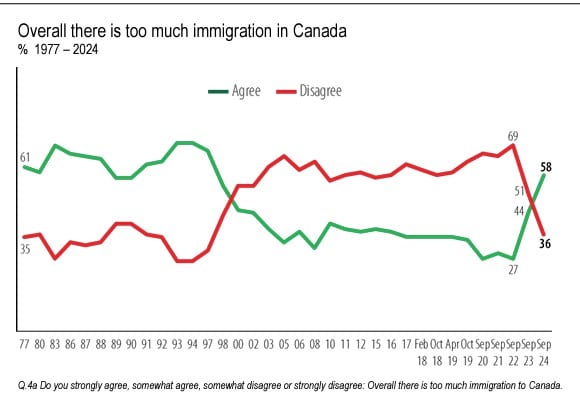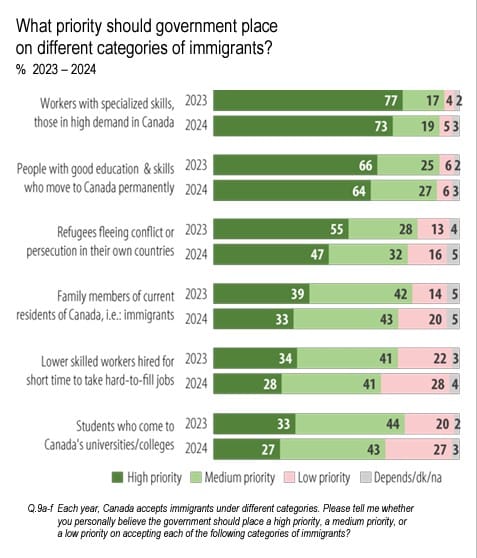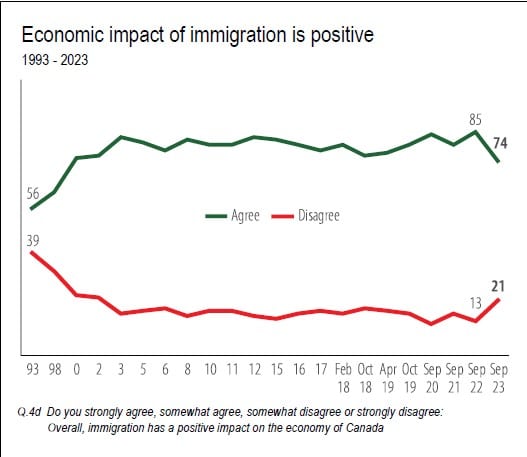
Canada’s support for high immigration has fallen to its lowest point in 25 years.
This is based on an annual study from the Environics Institute, a Canadian research organization that uses surveys to gather public opinion and gather data on social, political, and economic concerns in Canada.
According to this year’s data, six out of ten Canadians think that the country takes in too many immigrants, compared to four out of ten in 2023. The 2024 results show the lowest level of support for high immigration levels since 1998 and reflect a 14 percentage point increase in negative opinions regarding immigration levels nationwide.
Compared to the 2022 report, which revealed that support for immigration was at an all-time high after the COVID-19 epidemic, the last two years have seen a significant shift.
But since then, the national unemployment rate has been rising and Canada’s economy has recovered 138% of the jobs lost during the pandemic. Numerous recent modifications to Canada’s immigration laws, including a limit on the number of foreign students and the addition of temporary resident levels to the forthcoming Immigration Levels Plan, have been influenced by this.
More than 2,000 phone interviews with Canadians over the age of 18 served as the basis for the Environics poll. The population sample size used to obtain the results was accurate to within 2.2 percentage points of the total population.
Support continues to decline.
According to the report, respondents from the Prairie provinces showed notably low levels of support for immigration. 68% of respondents from Manitoba and Saskatchewan and 63% of respondents from Alberta felt that there was too much immigration in Canada.
Additionally, compared to prior years, the data indicated that younger respondents had less support for immigration. “Canadians under 45 years of age (up 20 points), compared with those who are older (up 13)” made this noteworthy.
The findings also indicated that first-generation Canadians and Canadian-born people had similar sentiments.

Similar to the 2023 study, respondents cited rising living expenses and the affordability of housing as major reasons for their waning support for immigration levels.
Although housing is still the biggest concern, a significant proportion of respondents now think that inadequate government management is the reason why immigration is an issue. According to the report, this was the case for 21% of respondents, which is 10% more than the previous year.
How immigration categories are prioritized by Canadians
Even among those who believe that immigration to Canada is excessive, less than 1% believe that no form of immigration should be given priority, according to Environics.
According to the institute, this demonstrates that, similar to the previous year, Canadians are “not rejecting immigration outright and consider some categories as beneficial,” despite their reservations about the number and types of newcomers that enter the nation.
In general, over three-quarters (73%) of those surveyed said they were inclined to encourage and give preference to newcomers who could perform highly skilled and in-demand positions.
Additionally, 64% of respondents viewed education for newcomers as a top concern.
In comparison, fewer Canadians (down 8% from 2023 to 47% for 2024) think that refugees escaping conflict should be given priority.
The idea of giving priority to the immigration of present residents’ relatives is even less popular. According to this, only 33% of Canadians are in favor of this type of immigration at the present time. Once more, the Prairies had the biggest drop in support for making family reunification a priority.
Results from 2023 show that support levels for low-skilled workers entering Canada temporarily have remained mostly unchanged. According to the survey, only 28% of Canadians thought highly of these workers.
Additionally, only 27% of international students expressed support. The largest drops were seen in western Canada and Atlantic Canada, where they fell 13 points to 27%.

Perspectives on the economy and immigration
According to the study, 29% of participants—a four percentage point increase—cited the sluggish economy as a reason why they did not support immigration.
Nonetheless, seven out of ten Canadians concur that immigration boosts the country’s economy.
Most support for immigration’s effect on the economy was found among Canadians with a university education, first-generation Canadians and those who support the federal Liberal and NDP parties.
Support drops sharply among those who vote for the federal Conservative Party, with just 21% saying immigration has a positive impact on Canada’s economy.

Canadian society and immigration
The number of Canadians who think there is a connection between immigration and crime has significantly increased, according to this year’s research.
When questioned whether they agreed or disagreed with the statement, “Immigration raises the level of crime in Canada?” there was a “substantial” increase in agreement. In Alberta, this was particularly true, with 48% of respondents agreeing—a 14% rise over 2023.
In addition to Manitoba and Saskatchewan, which both recorded increases of 20 percentage points to 41%, Ontario also exhibited a notable increase of 40%, up 19% from the previous year.
Again, in terms of partisan support, agreement with this statement was found to be strongest among Conservative voters (55%). However, more Liberal (up 11%), NDP (up 5%) and Bloc Quebecois (up 2%) supporters agree compared to 2023 results.
The advantages of immigration for Canadian communities
According to Environics, “on balance,” Canadians appreciate the contributions made by immigrants in their communities, notwithstanding a more negative assessment of high immigration rates.
In British Columbia, where 42% of respondents had favorable opinions about the local effects of immigration, this viewpoint is particularly prevalent. The Liberal Party (45%) and the NDP (47%), as well as university-educated Canadians (43%), shared this opinion nationally.
70% of respondents who expressed a favorable opinion of immigration stated, when given the chance to elaborate, that they “value what immigrants bring in terms of multiculturalism and diversity.”